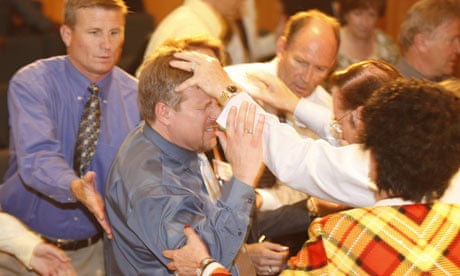As the piano strikes up, the congregation sways, palms to the ceiling, fists in the air, murmurs of hallelujah punctuating the music. Pastor Franck Lefillatre, besuited and bathed in the spotlight on his podium, intones into a microphone.
"Let out the words that are in your heart," he urges. His whispers crescendo to booming rhetoric. Behind him, emblazoned in gold lettering, are the words: "Jesus Christ: the same yesterday, today, eternally."
As evangelical services go, this gathering on a rainy Sunday afternoon is nothing unusual. In countless churches around the United States and many other countries it would be a staple means of Christian worship.
But this is not the American Bible belt. It is the Church of Paris-Bastille, and this congregation is just one of a growing number of evangelical communities spreading through France and prospering in spite of its staunchly secular – and Catholic – traditions.
From a postwar population of around 50,000, French evangelicals are now estimated to number between 450,000 and 500,000. According to the Evangelical Federation of France (FEF), the number of churches has risen from 800 in 1970 to over 2,200 today.
This week the boom made headlines when thousands of evangelicals – who are estimated to make up two-thirds of the country's practising Protestants – descended on Strasbourg to turn the 500th anniversary of Calvin's birth into a mass, media-covered event. It was not something even the most hopeful of believers could have prayed for.
For Lefillatre, whose church is part of the World Assemblies of God Fellowship, the largest global Pentecostal denomination, the growth is reflected within the bare, shabby walls of the Paris-Bastille. In the three years he has been pastor there, he said, the congregation has gone from around 250 to 350 or 400. Do they come every so often or without fail every Sunday? "Every Sunday," he said firmly.
On paper France would seem one of the least likely places for this branch of Christianity to gain a foothold. For centuries, Protestantism was the embattled minority in a country Catholics liked to call the "eldest daughter of the church" because of its strong ties to Rome. The minority that exists now still makes up just 3% of the population.
More importantly, though, ever since France harnessed popular discontent with the influence of Catholicism and wrote a separation of church and state into the constitution, the French republic has worshipped at the altar of laïcité – the concept of a secular state.
The gradual emergence of evangelicals as a force has, therefore, raised eyebrows, with some critics questioning whether their beliefs are compatible with the values of a secular republic. Not only are they known in France for speaking in tongues, "born again" conversions and a zeal denounced by some as manipulative proselytism, they are associated in many minds with the politically powerful movement of the US religious right.
Jean-François Colosimo, a writer and religious historian, provoked a furious backlash from evangelicals when, after it emerged that France's intelligence services had launched a "census" of the domestic population, he said: "Everything in France would seem to ban a politico-religious mixture. But laïcité is fragile and temptations are present" – a direct reference to the evangelicals.
These arguments are rejected as irrelevant by French believers. Just because they have the same faith as the Americans and a similar style of worship, they say, it does not mean they share the same politics. Daniel Liechti, vice president of the FEF, emphasised the need to recognise the European roots of the present-day movement.
"French Protestants and evangelicals fought for religion to be separate from the state in the belief that laïcité is a good thing. We do not mix the two. It is impossible to say whether French evangelicals are more left- or rightwing."
Sébastien Fath, a specialist in the spread of evangelicalism, agrees that there remains a "clear distinction" among French evangelicals between politics and religion.
But according to Henri Tincq, a religious commentator, issues such as abortion and homosexuality are creeping up the agenda. "These themes have been traditionally foreign to the evangelical culture in France. You find them now in evangelical networks, which do remain, nonetheless, minorities," he said. The fear is that, with its combination of doctrinal dogma and staunch moral beliefs, the movement could yet become a potent, if minority, political force.
Sitting in the Paris-Bastille after Lefillatre's Sunday service, Sylvain Vautier, 25, an engineer, dismissed any idea that his church was a copy of the US model. It was, he said, "much more balanced".
Yet, in some ways, Vautier embodies the zeal and dogma that leads many French people to regard his faith with suspicion. He bases his faith – and world view – on a "correct" interpretation of the Bible and admits that interacting with non-believers can be difficult. "When you're talking to someone, even on a professional basis, there's a difference," he said. "You think: I'm saved and you're not. It creates a bit of a gulf."
